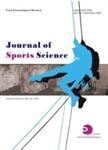Effects of Neuroticism on Partial and Whole Body Reactions under Stress
Effects of Neuroticism on Partial and Whole Body Reactions under Stress作者机构:Department of Sports Medicine St. Marianna University School of Medicine Kawasaki 216-8511 Japan Department of Sports Medicine St. Marianna University Graduate School of Medicine Kawasaki 216-8511 Japan Research Division National Center for University Entrance Examinations Tokyo 153-8501 Japan Department of Psychology College of Humanities and Sciences Nihon University Tokyo 156-8550 Japan
出 版 物:《Journal of Sports Science》 (运动科学(英文版))
年 卷 期:2015年第3卷第4期
页 面:155-164页
主 题:Personality traits stress reaction.
摘 要:Effects of neuroticism on partial and whole body reaction times were investigated under stress, or choking conditions in student participants (N = 127). We measured simple and choice reaction times of parts of the body and choice reaction times of the whole body in the participants with high and low neuroticism such as depression, cyclic tendency, inferiority feelings, and nervousness under the controlled stress scenario of being in front of people. Results indicated significant differences in reaction times of partial body, discriminative decisions and choice reaction times of participants in the high neuroticism group. Results of whole body reaction times were opposite to that of partial body reactions. However, a two-way factorial analysis of variance indicated neither a significant main effect, nor interactions between reaction times and personality traits. Whole body reactions suggest that the effects of stimulus transduction process from motor commands to motor outputs via motor neurons has a greater effect in the central nervous system than recognition and decision-making. However, it is possible that changes in the intracortical mechanisms related to cognitions and emotions could be correlated in partial body movements with nearly no muscular activity. Our findings suggested that delays indiscrimination, decision-making, and choice times could affect the performance of individuals.



